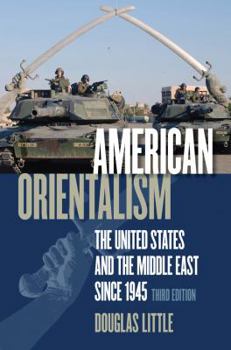American Orientalism: The United States and the Middle East Since 1945
Select Format
Select Condition 
Book Overview
Douglas Little explores the stormy American relationship with the Middle East from World War II through the war in Iraq, focusing particularly on the complex and often inconsistent attitudes and interests that helped put the United States on a collision course with radical Islam early in the new millennium. After documenting the persistence of "orientalist" stereotypes in American popular culture, Little examines oil, Israel, and other aspects of U.S. policy. He concludes that a peculiar blend of arrogance and ignorance has led American officials to overestimate their ability to shape events in the Middle East from 1945 through the present day, and that it has been a driving force behind the Iraq war. For this updated third edition, Little covers events through 2007, including a new chapter on the Bush Doctrine, demonstrating that in many important ways, George W. Bush's Middle Eastern policies mark a sharp break with the past.
Format:Paperback
Language:English
ISBN:0807858986
ISBN13:9780807858981
Release Date:April 2008
Publisher:University of North Carolina Press
Length:464 Pages
Weight:1.50 lbs.
Dimensions:1.1" x 6.1" x 9.2"
Customer Reviews
2 ratings
very readable history of U.S. involvement in the mid-east
Published by Thriftbooks.com User , 21 years ago
I discovered this book when a chapter from it appeared in a collection of readings for a college class on national security. The chapter, "America and Israel: the making of a special relationship" impressed me with its account of the events involving the two countries from before Israel's statehood. I've now read the entire book and find that chapter and another, "Opportunities Lost and Found" dealing with the issue of the Palestinians and attempts to find a way to peace in the area are the best of the volume. To revisit events in a concise, chronological order gave me a new appreciation of the frustrations experienced there in the last 50 years.Approaching the mid-east on different subjects, be it the oil issue, the Cold War, or the Arab nationalist movements, Little moves right along finding just the right amount of detail to relate. He is able to cover the same period repeatedly from different angles without repeating himself. Each chapter presented a new field of events to be tied into others already described. One comes away with a sense of the complexity of the mid-east. This is what Little is trying to convey.I did not feel that the author portrayed the United States as "bad" by any means. What he is saying is that the U.S. desire to make things better combined with an often simplistic view of the Orient can easily get the U.S. into trouble. He points out the there is "occidentalism" in the view from the mid-east of the U.S. It's no accident that he discusses Mark Twain's book "Innocents Abroad" in the first chapter and returns to it in the last.A second important point is that domestic politics can deflect the U.S. from a path it might otherwise follow, particularly in regard to Israel. Over the period covered, there has been no real Arab constituency in the United States, whereas pressure to support Israel has been constant, a fact acknowledged by every U.S. president from Truman on. There is no way the U.S. government can take an even-handed stand. Events described in the book provide evidence that momentary actions which are not interpreted as pro-Israel are all that can be taken by an American administration, because a groundswell of political opposition makes it's continuance impossible. I've lived through the time period of most of the events described, but I was enlightened by the relationship between them that Little reveals. This is a solid book that will keep your interest throughout. As mentioned, it stood out among the 35 readings for the class I took and the book as a whole did not disappoint.
Excellent Intro To American-Middle East Relations
Published by Thriftbooks.com User , 22 years ago
Douglas Little's historical survey of political, economic, and cultural relations between southwest asian countries and between these countries and the USA has been extremely beneficial to me. If you are interested in why some Americans are biased toward groups in the Mid East, Little focuses on this. If you want to understand Israel's creation as a state and the later problems between Israel and others in the region, Little provides an unbiased assessment of this. If you are interested in how US foreign policies have influenced the region, this is the book for you (as an introduction). In short, "American Orientalism" is well-written, objective, and extremely informative. If you think you understand the Middle East based only on news watching, or if you would like to know the historical dynamics at work in Middle Eastern countries, I urge you to read this book.





